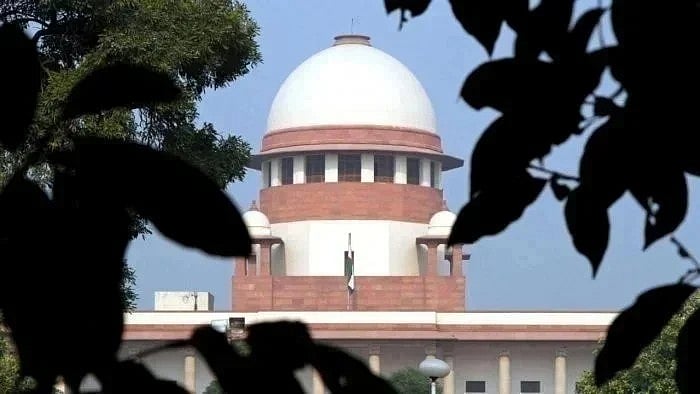
The Supreme Court of India.
Credit: PTI Photo
New Delhi: The Supreme Court on Monday acquitted a policeman's wife, brother, and brother-in-law in the 2006 murder of another policeman, apparently committed after being angered with persistent demands to repay a Rs 1-lakh loan.
Discarding the confession made before the police after the crime, a bench of Justices K V Vishwanathan and K Vinod Chandran allowed the appeal filed by Nagamma alias Nagarathna and two others against the Karnataka High Court's judgment, which affirmed the findings of a trial court on conviction and life term.
The prosecution alleged that on the night of March 10, 2006, Nagamma called the deceased to repay the loan and hacked him to death with the other two accused. After sunrise, she went to the police station and confessed to the crime to the station house officer (SHO).
The trial court acquitted her husband due to his plea of alibi — he was on duty in another police station — but held her and the two others guilty.
The appellants' counsel C B Gururaj submitted that when one of the accused was acquitted, it should inure to the benefit of the others as well.
Karnataka's Additional Advocate General Nishanth Patil contended the dead body was found in the house of the accused at her instance and there was no explanation by her. The motive was proved, and the extra judicial confessions further established the crime. The recovery of weapon also provided a link in the chain of circumstances.
Examining the matter, the bench said the confession made to the SHO, overheard by the police station sentry, had to be completely eschewed under Section 25 of the Evidence Act.
It also said the confession to the wife of the deceased and the police constable who arrived at the police station as a neighbour of the deceased had to be eschewed under Section 26.
After going through the facts of the matter, the bench said the motive projected and the crime itself had not been proved in the case at all.
"The presence of the dead body in the house of the accused is also under a cloud and in any event, that, with the absence of a proper explanation, cannot by itself bring home a conviction," said the bench.
It pointed out that the prosecution's case was that the deceased reached the house of the accused around 10 pm, while the death was confirmed as having occurred at 2 am.
"What happened in the interregnum is not clear and, there is a suspicion as to the genesis and origin of the crime, which compounds the reasonable doubt regarding the prosecution's case," said the bench.
The brother-in-law of the deceased categorically stated that he saw the body at the hospital and not at the house, it pointed out.
The court also noted two eyewitnesses — alleged tenants of the accused — turned completely hostile.
"We are at a loss to understand how the HC and the trial court observed that though they were declared hostile, there was credible material in their evidence pointing to the culpability of the accused," the bench said.
